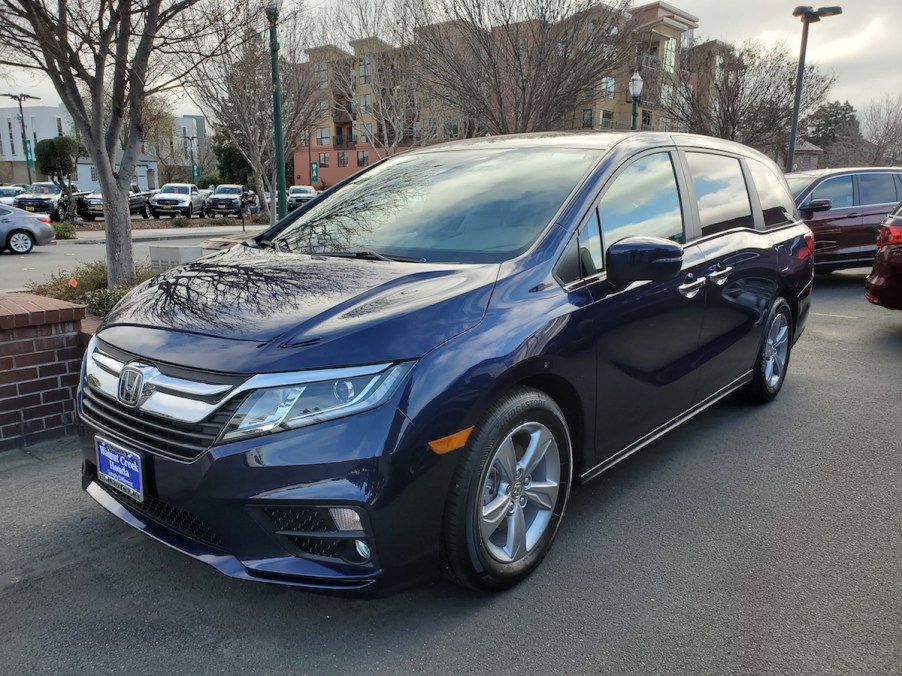
The 1 Type of Person Who Should Buy a Minivan Over a SUV
When it comes to choosing a people hauler, buyers have two basic options: a minivan or an SUV. Both are family-friendly, offer more cargo space than a sedan, and still give drivers more car-like handling. And the latest safety and infotainment tech is available in both types of vehicles. So how do you decide between the two?
For many people, the most obvious difference is the perception that an SUV has a cooler image than the imminently practical minivan. But which one has the edge in real characteristics such as price, comfort, safety, and others? What type of person should buy a minivan…or an SUV? U.S. News & World Report sorts out the winners and the losers in this comparison.
Minivans vs. SUVs: An even match in some ways
USN’s Braun says that SUVs and minivans are about equal in interior technology, especially if buyers splurge on higher-level trims. Those offer the most tech.
The main difference between the tech in the two types of vehicles is that the minivans’ amenities are more family- and passenger-focused, such as a built-in vacuum in the Honda Odyssey. On the other hand, SUVs’ tech luxuries for geared for drivers as in the Nissan Armada and Volkswagen Atlas, which both have rear automatic braking. Both minivans and SUVs come with rear-seat infotainment systems, Android Auto, and Apple CarPlay, and 360-degree cameras.
Performance and handling are additional areas where SUVs and minivans share a level playing field. SUVs like the Jeep Grand Cherokee Trackhawk and the Dodge Durango SRT are blazingly quick in the 0 to 60 mph heat, while others, like the Toyota 4Runner, are a bit more pokey. Handling on SUVs are also a mixed bag. Minivans perform more consistently and handle better than SUVS due to the car-like platforms that they are built on.
Fuel economy and maintenance costs are areas where it’s a toss-up between minivans and SUVs. Minivans consistently average between 20 and 23 mpg combined. SUVs arrive at similar numbers but only because hybrid SUVs change the game so significantly with great gas mileage. Sport utility vehicles—particularly the large ones—with conventional gas engines don’t sip fuel with EPA estimates hovering around 16 mpg or lower. And SUVs with AWD or 4WD are more costly to maintain than minivans with their simpler FWD or RWD drivetrains.
The benefits that a minivan offers
Price is a key factor for many consumers in the battle between minivans and SUVs, and the former has a distinct advantage. On average, the starting price of minivans run about $6,300 less than that of three-row SUVs. The difference between upper trim levels in both categories is even greater: for example, the Honda Odyssey Elite starts at $47,320 while the Honda Pilot Elite begins at $48,120. Luxury SUVs are even pricier and can cost on average over $18,000 than a base-trim minivan.
Minivans also hold the advantages of cabin comfort, legroom, and access over three-row SUVs. SUVs typically have five inches less legroom in their third row than the third row in minivans. Overall interior space in the average minivan exceeds that of the average SUV by 15 inches. Easy access to the third-row seats through rear sliding doors is another benefit that minivans offer over SUVs. Minivans’ cargo space is roomier than that of SUVs as well.
The advantages that an SUV has as compared to a minivan
By comparison, SUVs reign supreme in safety, thanks in part to their higher ride height and outstanding visibility. Several SUVs’ strong showing in crash test ratings from the Insurance Institute of Highway Safety (IIHS) also help to make this type of vehicle a safety winner. One example is the three-row Mazda CX-9, which received the IIHS Top Safety Pick+, IIHS’ highest award. Other SUVs such as the Subaru Ascent and the Kia Telluride won the organization’s Top Safety Pick.
SUVs are also kings of the road when it comes to offroading and bad weather handling. Many come standard with either all-wheel drive or four-wheel drive. As USN’s Braun notes the Toyota Sienna is the only minivan available with all-wheel drive. Compared to minivans and sedans, several three-row SUVs such as the Land Rover Range Rover are ruggedly built for adventuring off the pavement.
So, we arrive at the question of what type of person for whom a minivan would be a good fit? If you have a growing family, the minivan is the best choice. Its additional interior cabin space, easy third-row access, kid-oriented infotainment features, and attractive pricing are all assets if you’re chauffeuring several children around. And if you are making repeated trips to Costco and other big box stores, a minivan has the cargo space to carry jumbo boxes of cereal and the rest of your grocery haul home.
On the other hand, if you can’t wait to leave the highway and hit the rocky trail, an SUV equipped with four-wheel drive is a great option. Worried about wet roads on your commute? You’ll have a number of SUVs with all-wheel drive to choose from. If your recreational plans involve towing a boat or a camper, an SUV that has been built on a truck-based platform can do the job well.


